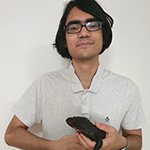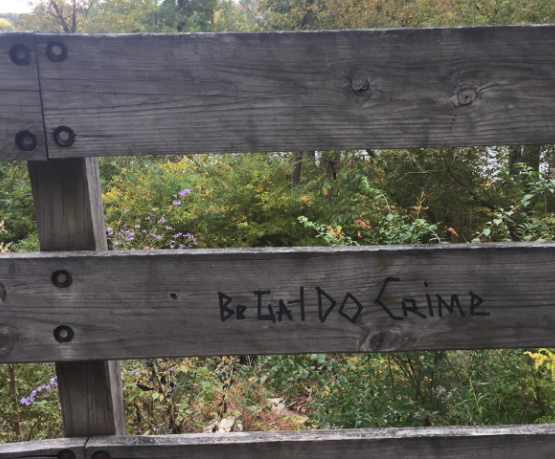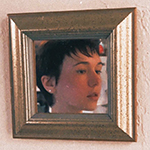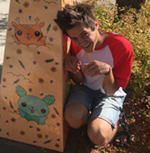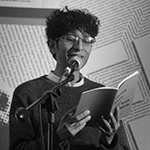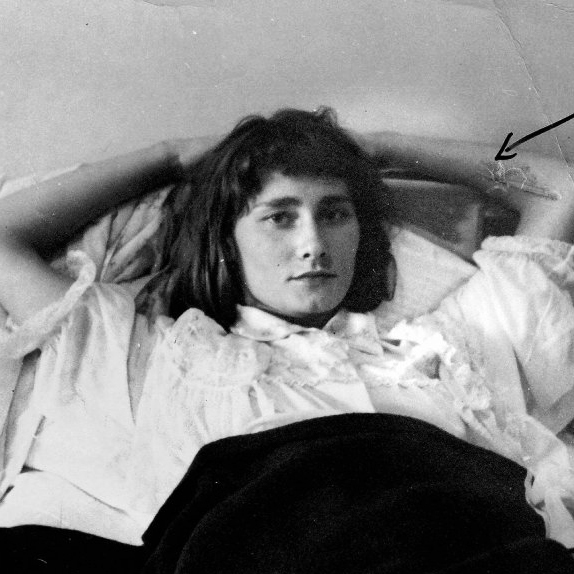The Fruit
We grow the fruit in between rooted clouds of clover and fennel, redwoods. Those trees left standing, charred from some fire that nearly ravaged the hill years before we bought the house on the coast.
The fruit’s flesh is the color of cold bronze evening light. Reams of green, translucent pearls cluster at its center. The pulp quivers as you cut open the darker green skin, but there’s muscle to it, like a birth sac.
I still lose my head in the mirror a lot. It’s my scar from the ceremony.
According to my teacher Leroy, the world’s expert on headlessness, who Skypes me from the UK, he calls it just seeing what is. None of us have any heads, actually. He writes books on the matter.
“I was intensely looked at, at home as a child, but when I went out into the world, into school, I was treated as a no-one and nothing. So this ‘gift’ has been confusing, to say the least,” I write to Leroy one night.
He sends me back the plainest smiley emoticon.
“You can’t force a mouth open that doesn’t wanna eat,” Leroy murmurs. Behind him, a wall full of heads, pictures of his children and grandchildren.
Can you even see your own head right now? I try to ask others , in small gatherings, as Leroy has coached me. No, you can’t see it, I explain, as someone itches his nose, or another smoothes down her hair.
It happened the other day. I could feel it coming on at a playdate for my youngest son. The mother was frantically scooping up the blocks, trains, and plastic food toys the children had left in their wake. “I’m sorry,” she kept muttering. “This is just my thing. I can’t help it.”
The other woman at the playdate, a new neighbor with a three month-old on her chest, kept offering to help, even as her own bundle squirmed and clawed at her until the wailing began. I squatted down and did my own unnecessary share, but the presence of the screaming baby, the distraction of the host in her desire for order brought it on. Anytime it felt I was not meant to be in this world, or that others did not want to be with me, it came on.
I’m not going to look, I’m not going to look, I kept thinking. But when my son had to poop and I had to help wipe him, there it was in the mirror— a bare prancing flame above my shoulders, my son’s curly little head aping and cheesing in the glass next to “me,” splashing water all over the sink. “This is how I wash my hands, Mom,” he said, spreading foamy soap into the basin with his palms.
Back in the playroom I kept touching my face. Yes, sensation is there, Leroy would say, but that sensation of touching your face is a mental object, not the true reality of who you are. An object, like all the scattered playthings before me.
“Is something wrong with your face?” the hostess asked. Our children, on opposite sides of the playroom, were no longer playing together, fixated on their own spontaneous framings of objects meant to look like cars, fruit.
“Oh, just a bug bite or something.”
My husband has eaten the fruit seven times.
When we argued last night, about my lack of desire for sex, his head seemed to shrink. Would it turn into a flame as well? His voluptuous lips I’ve always enjoyed kissing remained about the same size. His eyes became large green marbles pooled with anguish. The flesh, what occurred around those seemingly solid, private portals into his own sensory experience, diminished, like a child’s balloon a week after her birthday party.
It happened just as the windows in the room we sat in darkened into night. Outside, I noticed the solar paper lantern I’d hung with fishing line now just sat on the grass—one of our sons had batted it down. Whatever the sun had rubbed off into its small battery now glowed through perforated blue paper.
Since first eating the fruit he’s wanted more and more sex, a few times a day if he could. I’ve wanted less—once a month would suit me fine.
It seems so gratuitous to me, after essentially dying during the ceremony. After first seeing my headlessness in the mirror in the bathroom, in between puking, the guttural flame above my shoulders.
“Are we dead now?” I remember asking Mim, an older woman who was once very beautiful. The juice of the fruit’s seeds—we had to eat it in big bites in order to get through the foul taste—had dripped all over her linen pants; her white hair lay in sweat-flattened strands on her cheeks. During the ceremony, I saw her take on the body of a very small child, but with her sixty-ish face.
Later, in the following morning’s integration circle, we discussed what we had all seen. We sat on the rug in the big room facing the ocean. That day the ocean was plaintive, silky, and grey, as if it too had taken too many drugs.
When she was three years old, Mim explained, she had been left in a body cast for two weeks, to repair some sort of hip aberration. Those were the days parents were not allowed to visit children in the hospital. Instead, they sent in a clown who would grumble at Mim, then hurry out of the room as she screamed. She’d returned to that raw state during the ceremony, to that child’s frightened body.
I’d also seen the female shaman grow as huge as “the big man” statue, the one with the black beard and cartoonish muscles in front of the tire store, in the central Illinois town where I grew up. I had always pointed to it from the car as a little girl in excitement, and I did the same thing now—pointing, exclaiming, from my yoga mat.
Once ten feet tall, she then spread her black wings over us and murmured in tongues. Skull cascades shimmered across my sight in a scowling chainmail swarm.
One of the women across the room, a heavy chainsmoker with a son in prison, was making her way out of a cocoon of black vapor, grunting.
Then, in the morning, we were greeted again by the ocean, the pelicans, a stubborn owl, coffee. Talking about nail colors, even. Normalcy was a god reborn to me that morning.
Mim and I would email each other throughout the year following the ceremony. She said she kept seeing angels through her window above her sink, floating above her grandkids’ toys out in the yard. But it’s odd, she wrote. They seem faceless. I can’t remember any of their faces, just that gorgeous quality of light.
Like Jesus rising from the tomb—like a cancer suddenly disappearing—or a beloved friend somehow reappearing, after days of being lost in the woods without food or water. This is how our Earth will regain its strength slowly as each of us ingests the fruit, Hermes Igra wrote. But it must be all of us.
Hermes, extremely rich, heads the foundation for the fruit. My husband and I are two of the top funders, along with being crop-hosters. As the population dwindles, it seems possible a mass feasting could occur.
I’ve always enjoyed staring from his velvet couch into the folds of his oil paintings. They are mostly Pre-Raphaelite women, heaving against windows and walls.
If it wasn’t for his age, his little tweed cap, his former atheism, his Oxford education, his parents’ deaths in the camps, we would have written off his vision as tomfoolery, just as the government has.
Leroy would have laughed at me if I were to list these assets of Hermes’, these mental objects, as the trousseau of evidence inviting my trust.
“He’s not a guru, or anything,” I tell others, resisting my own squeamishness. “Just a deep soul who’s done a lot of drugs, responsibly, in order to expand his own consciousness, and to even save the world.”
Hermes is extremely quiet. Once he offered me a Vitamin C IV when he saw me sneezing. Another time, he whispered to me on his balcony over the bay, at his eightieth birthday party, fireworks dirtying up the sky, “You see, my dear, it’s the ones who haven’t eaten this fruit who are going to kill us all. They would never permit themselves anything but a perp walk down the aisle—to marry the last ashes of mindless consumption.”
Looking back, he was probably high that night.
The male shaman was a balding, handsome part-time coffeeshop owner from Ottawa. He chanted for six hours, with the warbling, sweet voice of a deeply enlightened goat who has only ever known freedom. At the end of the ceremony, he handed out CD recordings of himself so that we could always remember, and would go back.
The female shaman was beautiful. I’d worried about her when my husband told me, yeah, she’s hot. I couldn’t quite look at her beauty, afraid it would make me judge her, but first her softness took me in, and then her devastating transformation into the angel of death while we are all puking and writhing.
Later I found out the shamans were a couple who broke up shortly after our ceremony. I don’t remember them interacting much, except to stand side by side in the morning in the kitchen, him handing her melon and strawberries from a cloth bag to chop up for our breakfast, and then, as we ate, sharing a hand-rolled cigarette outside.
Hermes says that if my husband wants to join a small group of them, they could summon, through an extremely powerful ceremony in deepest Peru, what is needed to exterminate those leaders who deny what’s happening, what the sun has in store for us.
The crust of the sunset is scattering through stained glass windows, jewel-toned depictions of maidens, trumpeters, sheep, made all the more intense by the light. But it’s hard to remark on the beauty of those sunset colors anymore, as the sun grows closer, dangerously closer.
It may not solve everything, Hermes continues, but at least we could attempt to eliminate the spewers who declare all the science out there nonsense.
“All we would need to do is look at images of them. It would be a few of us fruit loopers in a circle. If we focused long enough, they would perish.” Fruit loopers are those who have eaten ten times or more.
“So it would be some kind of voodoo assassination?” I ask through a mouthful of cake. We stand in Hermes’ study, in front of a vertiginous De Chirico depicting a map of islands crammed under a jumble of right-angle tools. Hermes’ eighty-first birthday party, unlike his drug-fueled eightieth (were those fireworks for him, but he couldn’t quite admit it?), seemed at first to be more of a fireside chat fundraising kind of affair, now clearly a hitman audition.
“Please don’t do it,” I say to my husband after we get the children into bed that night. “It’s too much. These are fathers, these people, sons.”
He holds me and murmurs that he won’t. I trust him. And slowly, feeling his hands on my breasts, my cheeks, I become an animal performing the act of love again, however headless. Which I am again, later in the mirror, brushing my teeth, a bare flame above my bobbing, naked shoulders.
“It’s all just a movie, love. And you are creating it when you open your eyes! You! The One!” Leroy had sputtered a few nights ago, spit flying out onto the screen between us. A Mickey Mouse bandaid above his eyebrow. “Ah, yes, I banged up my head on the garden shed ceiling,” he explains.
It’s three o’clock by the ocean. I move to get the matches because that’s what my own mother had done—burned the tick off my scalp. The tic wanted my son’s flesh like a blanket to tuck itself under.
Nate sees me on his way out in his truck, struggling with a crying child and a box full of matches. Then, after fetching his first aid kit, he tweezes the tic out of my son’s torso so effortlessly. My son hardly makes a sound, then runs off.
Nate lives up the hill, has grown up here, and as an EMT, has seen people die out on the cliffs after doing too many drugs. He’s never eaten the fruit, but, after signing the NDA, we pay him to help us prune and water it.
We sit on the grass. Nate tells his own childhood parasite story. A sea urchin’s spikes, ejected from his skin over the course of a few days. There was no need to force it. His mother had waited, while mine had taken to frenzied action, as instructed by misguided wives’ wisdom, her own fear.
I can barely be with the children if there are mirrors nearby. I texted my husband last week if we could take them down here and at home in the city. He encouraged me to face my fear. “Can’t do that, hehe,” I texted back.
“Could I take a shower, hon?” Nate’s twenty-year old wife, who he met online and moved here from rural Illinois, pretty close to where I’m from—lazy eye, mild acne, but beautiful in her indifference to her flaws, appears on the driveway, in a fuzzy grandma robe. She is six months pregnant. Their house is close enough up the hill that she can pop by to ask.
“Gotta get propane in town, then you can, babe,” he growls softly back.
I don’t know why this simple exchange sends me into such a dark place. It’s probably also the new reports of those faint lesions in the magnetic field, readying themselves for the sun’s next punch.
Hermes has advised in his newsletter that children should begin eating the fruit. I remain adamantly against it. My husband still can’t quite say yes or no to it.
“It’s unclear who to really trust now,” he’s saying. Tonight is our last night at the house on the ocean for a while. By the fire we know we shouldn’t have lighted, I feel the darkness surfacing in me, feeding off of the material of our tense conversation like a matted animal, coming around for scraps. It’s our tenth wedding anniversary.
“My body’s falling apart,” he says sadly. His tinnitus has returned, a high pitch like a constant fluorescence when all you want is darkness. Hermes told him it was just tuning into the frequency of truth. But Mim, who works as an ear doctor, who stopped seeing her own residual angels a few months ago (I guess all spiritual experiences must fade, after a while, she sadly wrote) saw my husband last week. She told him there was really no cure for it. That he would have to learn to just live with it.
Then he tries to find the word for something and can’t. “I’m losing my memory, too,” he sighs as we watch a thread of pelicans air-gallop across our view. I feel so glad to see them doing okay, still.
“Well, it’s not like the word for bread,” I offer.
I still can’t sleep next to my husband, not really. His body generates so much heat. And that gives me comfort.
So I go into my older son’s room. He will kick me less in the night than my younger son. I curl up beside him. But not before setting an alarm to wake at dawn so I can go tear out the fifty or so fruit, one by one.
The young wife, after stopping on her way back to her house, agreed to help me. I told her—unlike Nate, she’s oblivious to the motives of our stockpiling—it was for a surprise for my husband, for our anniversary. To clean it all out, this inedible non-native fruit, for a new vegetable garden.
I’ll blame it on a thief, whether human or animal. I’ll throw the answers into the ocean.

Jenny Gillespie Mason is a writer, editor, musician and mother living in Northern California. She received her MFA in poetry from Warren Wilson College. Her poetry has been published in Missouri Review, Meridian, Borderlands, and elsewhere. Her music project is called Sis and her most recent album Gas Station Roses was released in 2019.

 BACK TO ISSUE
BACK TO ISSUE
